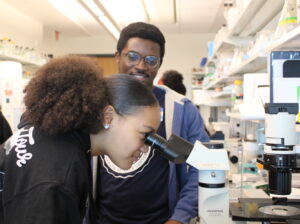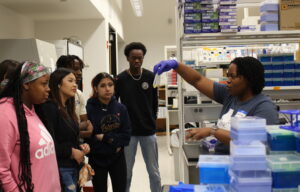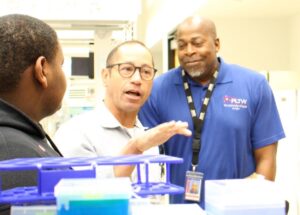SBS alum returns to the lab with his own high school students
 Quinton Barnes teaches principles of biomedical science, human body systems, medical interventions, biomedical innovation and practicum in STEM at the Bill R. Johnson CTE Center in Crowley ISD. He’s also a former student of the School of Biomedical Sciences at The University of North Texas Health Science Center at Fort Worth. It was Barnes’s enthusiastic passion for what he learned at HSC that inspired him to start a biomedical science program where he currently molds the minds of the future generation.
Quinton Barnes teaches principles of biomedical science, human body systems, medical interventions, biomedical innovation and practicum in STEM at the Bill R. Johnson CTE Center in Crowley ISD. He’s also a former student of the School of Biomedical Sciences at The University of North Texas Health Science Center at Fort Worth. It was Barnes’s enthusiastic passion for what he learned at HSC that inspired him to start a biomedical science program where he currently molds the minds of the future generation.
“The University of North Texas Health Science Center has been very pivotal in my educational and career journey,” Barnes said. “I had no idea about biomedical sciences or anything it entailed prior to becoming a summer intern at HSC as a Tuskegee University undergraduate.”
Barnes’s experience as a McNair Scholar motivated him to apply to the graduate SBS program.
“Being a part of the HSC student body allowed me to gain invaluable insight about biomedical sciences and its vast importance to those in health disparity and underserved, lower socioeconomic communities,” he said. “Reflecting on the outstanding exposure to a wealth of knowledge and unforgettable experience, I thought that every student should have this wonderful opportunity as early as possible.”
A master’s student at the same time Dr. Harlan Jones, director of the Institute for Health Disparities, was earning his Ph.D., Barnes reconnected with Jones to bring 65 of his high school students to visit the HSC campus and gain a better understanding of what it means to pursue higher education and careers in STEM.
“Preparing the next generation of STEM professionals requires giving aspiring young students the opportunities to picture themselves in STEM careers,” Jones said. “I am delighted that a former student of HSC, Mr. Quinton Barnes, reached out to us to expose his students to possible career paths through HSC. I greatly appreciate the partnership we have with Crowley ISD.”
The Institute for Health Disparities is dedicated to advancing health equity by building solutions for healthier and more diverse communities.
“Our K-12 programs expose minority students to the possibility of careers in biomedical science, while our faculty development initiatives train educators in the health care space, as well as HSC students, to carry on the Institute’s legacy of promoting diversity,” said Dr. Jamboor Vishwanatha, regents professor and vice president of HSC’s Institute for Health Disparities.
Through several NIH-funded initiatives focused on minority health, the Institute impacts researcher diversity, encourages equity in data used in artificial intelligence and machine learning, conducts research and outreach to address COVID-19 disinformation and more.
“There are dramatically disproportionate numbers of minority students who complete postsecondary education when compared to their majority counterparts,” Barnes said, citing a study conducted through the Stanford Medical Youth Science Program. “The numbers become even more disproportionate when you compare minorities earning degrees in biomedical science and health professions.”
 “I am always looking for ways to augment the learning material and concepts being taught to my students and a huge proponent of exposing students as early as possible to all things involving biomedical science,” he added.
“I am always looking for ways to augment the learning material and concepts being taught to my students and a huge proponent of exposing students as early as possible to all things involving biomedical science,” he added.
During their visits, the ninth-12th graders were given tours by HSC student volunteers in the SBS and Texas College of Osteopathic Medicine. The high schoolers learned about glaucoma and the research HSC students are conducting in the lab at the North Texas Eye Research Institute; were given tours of Dr. Jones’s lab, which studies the impact of stress on the body; visited The Regional Simulation Center where virtual reality is utilized to train future physicians and practitioners; and observed The Center for Anatomical Sciences where students were able to witness a graduate researcher demonstrating her work with a cadaver.
Dr. Raghu Krishnamoorthy, professor of pharmacology and neuroscience at the NTERI, spoke to the groups of touring students and imparted some wisdom about the work he and his students conduct: “Everything we do benefits mankind.”
Barnes continues the legacy of HSC not only through his teaching but also by remaining connected to the school through the Institute for Health Disparities.






Social media